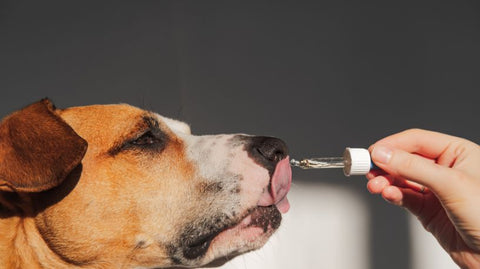

A Guide to Managing Stress and Your Dog’s Digestive Health
When we think about stress, we usually imagine a hectic workday or an upcoming deadline. But did you know that your dog can feel stressed too? Just like in people, stress can greatly affect your pup’s gut health. Let’s explore how stress can upset your pup’s tummy and what you can do to help as a pet owner.
The Connection Between Stress, Bowels and Gut Health
Stress and your dog's digestive health are closely connected. Your canine’s gut has many tiny living things called the gut microbiome. This microbiome is important for digestion, absorbing nutrients, and helping the immune system. When your dog feels stress, like from changes in their routine, loud sounds, or separation anxiety, it can disturb this balance and harm their gut health.
How does stress affect a dog's digestive health?
Stress can harm your dog's digestive health. It may cause diarrhea, vomiting, and loss of appetite. When your dog is stressed, a hormone called cortisol gets released. This hormone can upset the microbiome in the gut, leading to digestive issues. To help keep your dog's digestive health in good shape, provide a calm environment and a balanced diet.
Here’s how stress and your dog's digestive health can impact each other:
- Less Variety of Gut Bacteria: Stress can reduce the number of good bacteria in your dog’s gut. This can lead to digestive issues and lower immunity.
- More Inflammation: Stress increases cortisol, a hormone that can cause inflammation in the gut. Ongoing inflammation can lead to serious issues like Irritable Bowel Syndrome (IBS).
- Changes in Food Movement: Stress can change how food moves through the digestive tract. This can cause diarrhea or constipation.
Can reducing stress levels improve your dog's digestive health?
Yes, reducing stress levels can significantly improve your dog's digestive health. Stress in dogs can lead to digestive issues like diarrhea and vomiting. Implementing stress-reducing activities and a calm environment can promote better digestion and overall health for your furry friend.
Understanding the Dog Microbiome and Its Effects on Health and Mood
Just like us, our dogs' moods can change because of different factors, including gut health. A dog’s microbiome is very important in affecting their behavior and mood. If their gut is not healthy, it can cause problems with neurotransmitters like serotonin. This can hurt their well-being and mood regulation. To help your dog feel happier and healthier, make sure you support a balanced microbiome. You can do this by managing stress and providing good nutrition. Remember, a happy gut leads to a happy dog!
articlebanners1
Signs That Stress Is Affecting Your Dog’s Gut
So, how can you know if stress and your dog's digestive health are clashing? Watch for these common signs:
- Changes in Appetite: Stress may make your dog feel less hungry or eat less than normal.
- Diarrhea or Constipation: These can show that your canine companion’s gut needs some help.
- Excessive Gas: A lot of gas or really smelly gas can show that something is wrong with digestion.
- Vomiting: Sometimes vomiting is okay, but if it happens a lot, it might mean your dog’s gut is stressed.
Behavioral Signs of Digestive Health Issues in Dogs
There are several signs to notice if your dog's gut health might not be good. Here are some key signs to watch for:
- Changes in appetite: A sudden change in how much your dog eats could show digestive issues from stress.
- Increased aggression or irritability: Gut health can change your dog's behavior, causing a different mood.
- Excessive licking or chewing: Dogs might lick or chew a lot to feel better when their belly is upset.
- Persistent diarrhea or constipation: Ongoing digestive problems can lead to constipation or diarrhea.
- Lack of energy: Bad stomach or intestinal health can lower your dog's energy levels and interest in playing.
How to Support Your Dog’s Gut Health: Nutrition and Supplements
There are ways to help your dog have a healthy gut, even when life gets tough:
- Provide a Balanced Diet: A diet that is high in fiber and prebiotics can help keep a healthy gut. You can add foods like pumpkin or sweet potatoes to your dog's meals.
- Use Probiotics: Probiotic supplements can support the good bacteria in your dog's gut, especially when they feel stressed.
- Exercise and Play: Regular exercise is good for reducing stress and supporting healthy digestion.
- Calm Environment: Reduce stress in your dog's space. Give them a quiet place to relax and think about using calming tools like pheromone diffusers.
- Routine Veterinary Check-ups: Taking your dog to the vet regularly can help find any problems early and keep their gut health in good shape.
articlebanners2
Diet's Role in Supporting Dog's Gut Health
Your dog's diet is very important for their digestive health. A balanced diet with fiber and prebiotics is key. Adding probiotics and flaxseed will also help. Regular exercise helps support your dog's digestive wellbeing, especially during stressful times. A calm home and routine vet check-ups are vital, too. If you see digestive issues or if your dog feels weak, think about these ways to help keep them healthy from the inside out.
Antibiotics, Probiotics and Immunity and Your Dog's Digestive Health
Your dog's tummy can feel bad after taking antibiotics. Antibiotics can change the balance of bacteria in their stomach and GI tract. This can result in problems like diarrhea or an upset stomach. Probiotics can help here. These are supplements that put good bacteria back into their system. They also support your furry friend’s immune system during and after antibiotic use. By adding probiotics to their diet, you can help keep a healthy gut microbiome. This way, your furry friend can stay strong and feel good.
Our dog's digestive system is very important for their overall health. It affects many things like their immunity, weight loss, and even their mental health.
The Impact of Environmental Factors on Dog's Gut Health
In addition to diet and supplements, several environmental factors affect your dog's digestive health. Enough sleep, outdoor activities, and social interactions can all help improve their gut microbiome. A well-rested dog can handle stress better. When dogs explore new environments and meet other animals, it helps mix up their gut bacteria. These factors also help strengthen your dog's immune system since many immune cells are found in the gut. Just like people, dogs need a balanced lifestyle. This balance includes nutrition and good mental and physical health. By focusing on these environmental elements, you can help your pet keep good digestive health and a strong immune system.
Conclusion
Stress happens to everyone, even dogs. A good way to help your dog feel better is to know how stress and your dog's digestive health are connected. Responsible dog owners can do things to keep their dog's tummy happy and healthy. A balanced tummy is important for your dog's health. Watch for signs of stress and do something about it when you see them. A healthy pup is a happy pup!
articlebanners3



